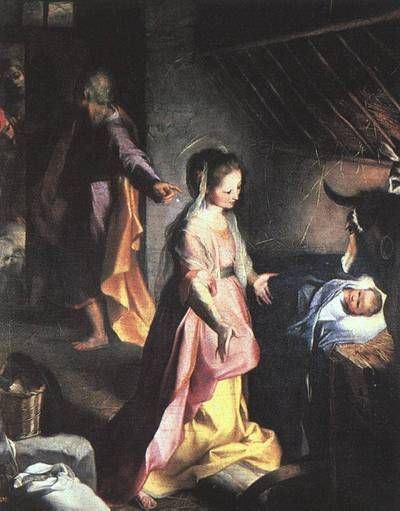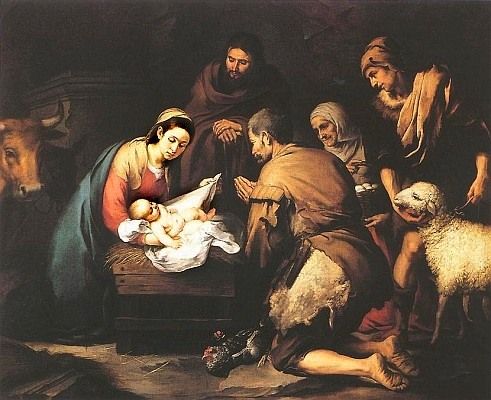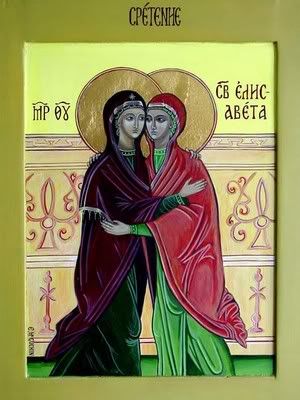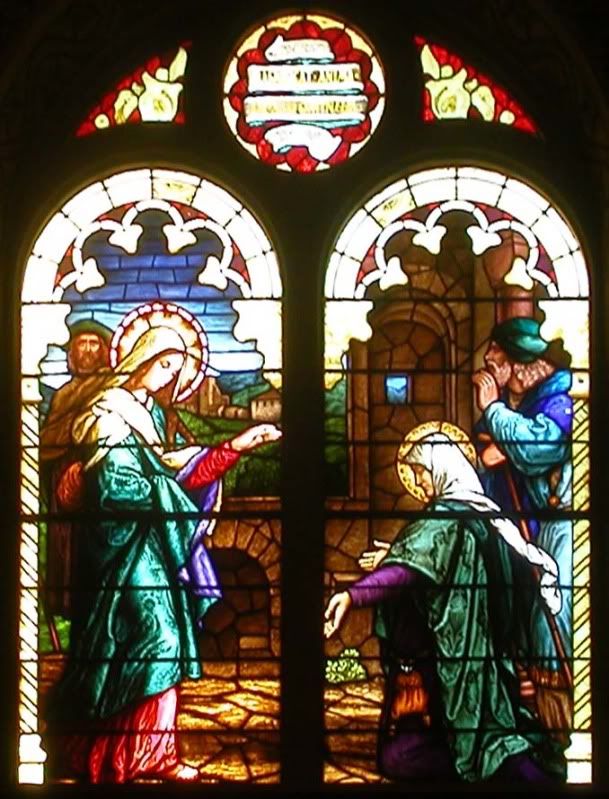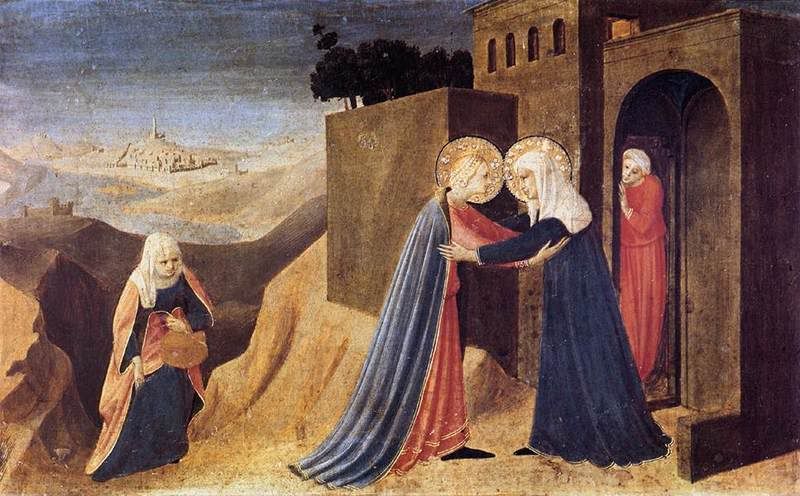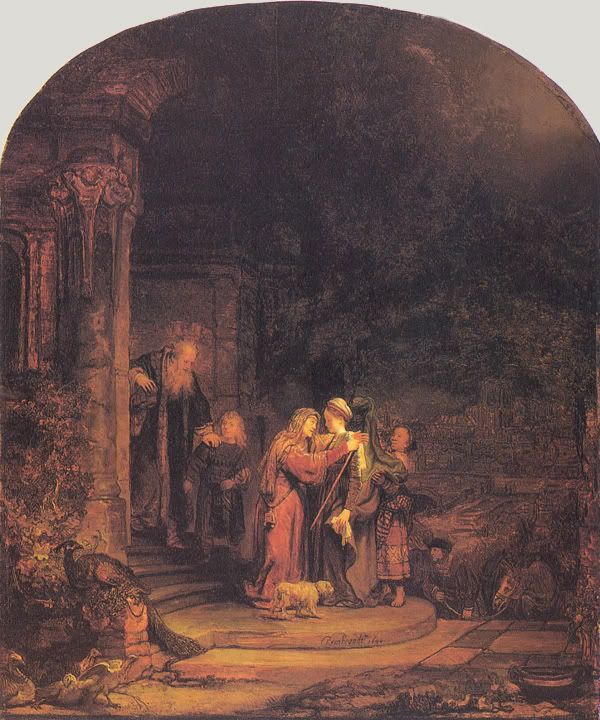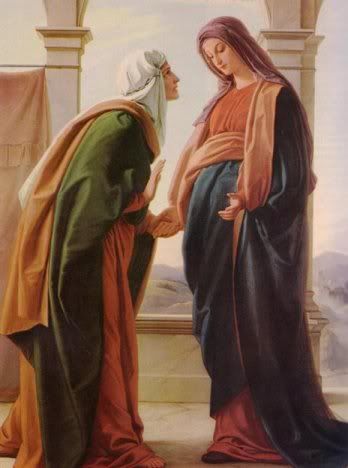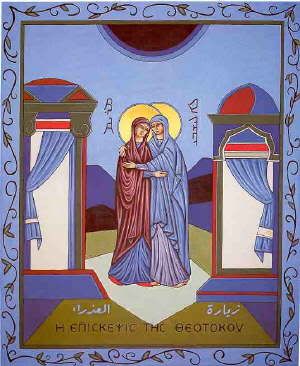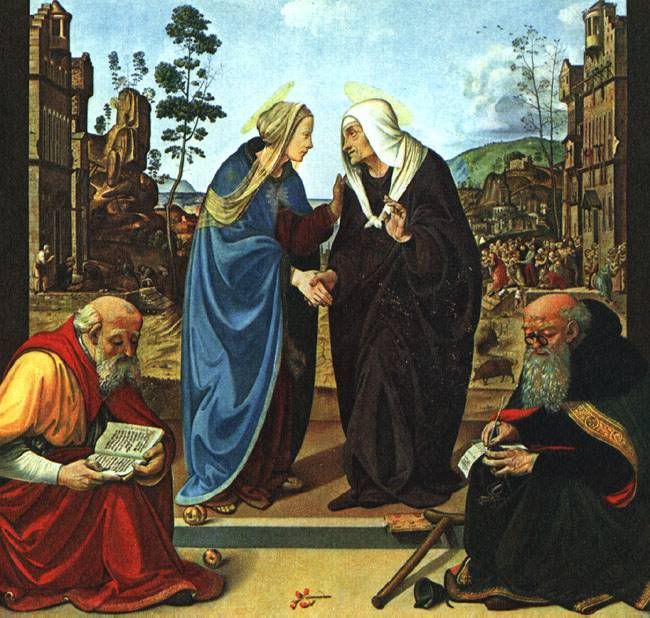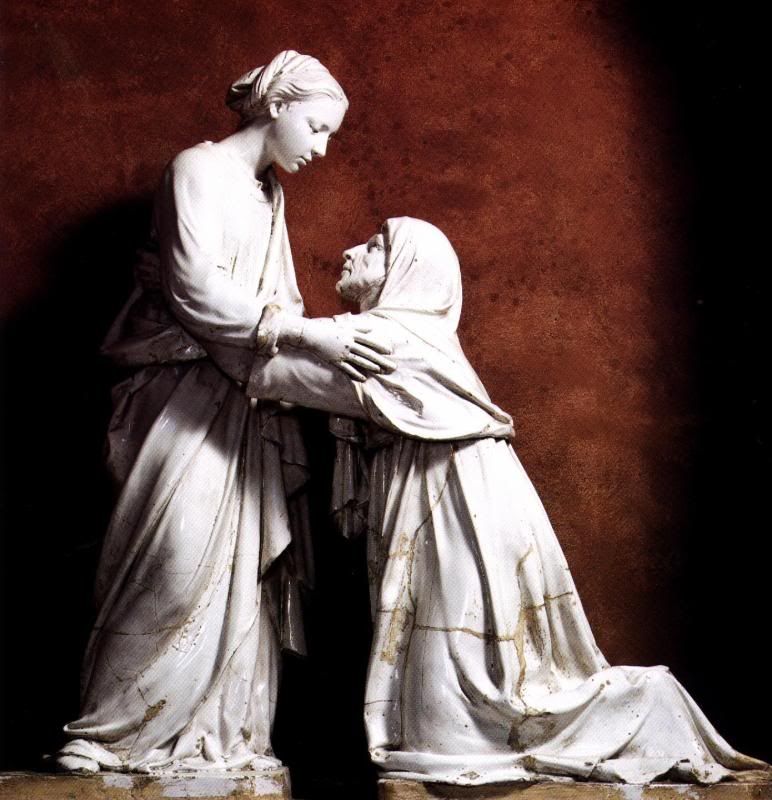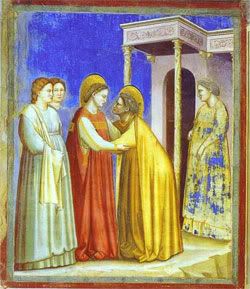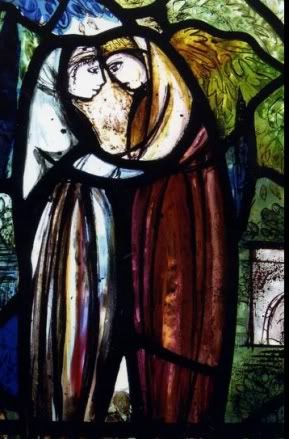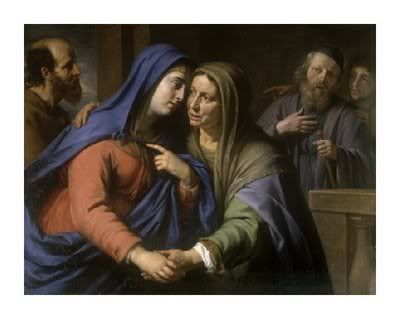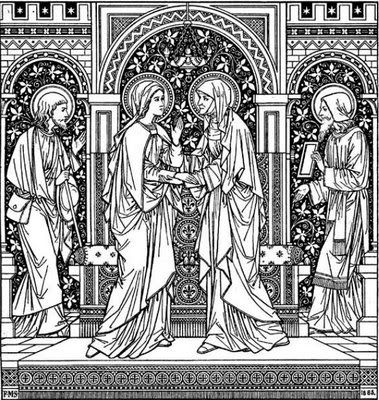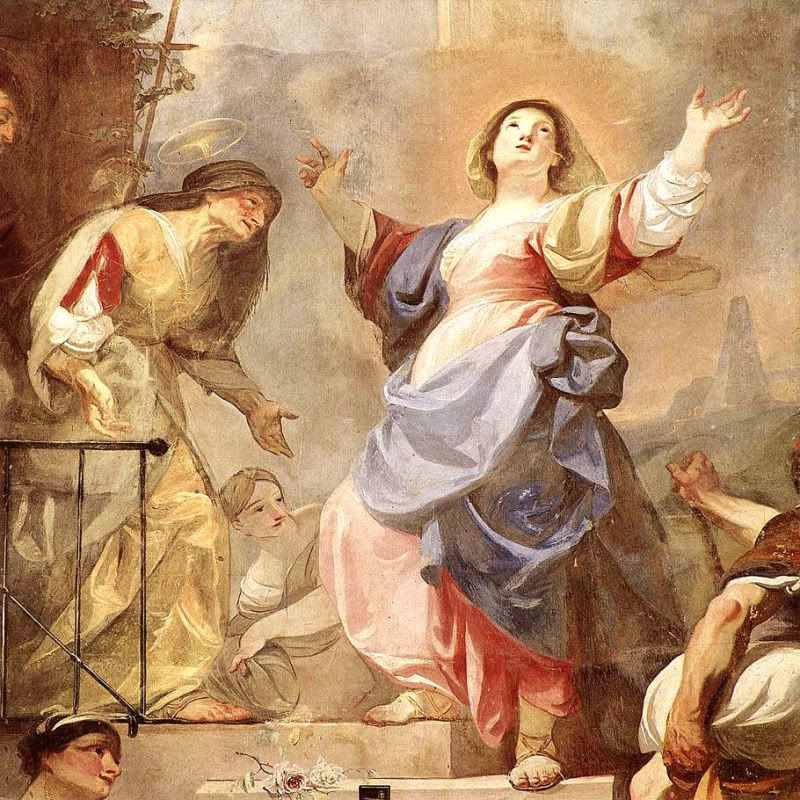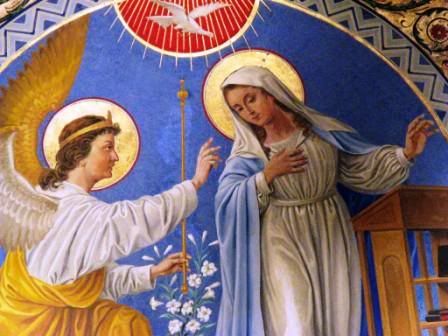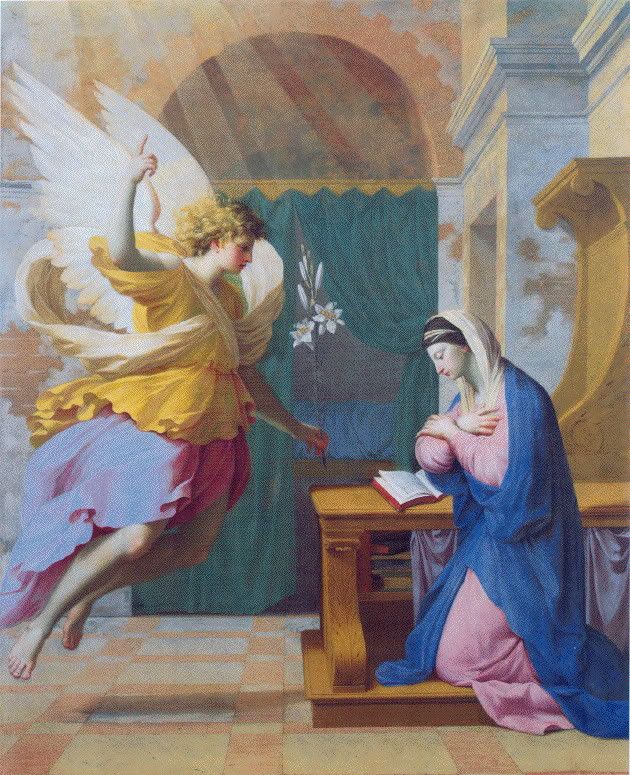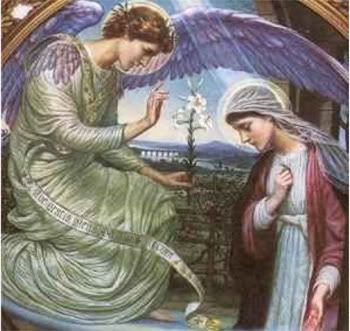2 The people who have walked in darkness
have seen a great light;
on those living in the land of deep darkness
a light has dawned.
3 You have enlarged the nation
and increased their joy;
they rejoice before you
as people rejoice at the harvest,
as warriors rejoice
when dividing the plunder.
4 For as in the day of Midian’s defeat,
you have shattered
the yoke that burdens them,
the bar across their shoulders,
the rod of their oppressor.
5 Every warrior’s boot used in battle
and every garment rolled in blood
will be destined for burning,
will be fuel for the fire.
6 For to us a child is born,
to us a son is given,
and the government will be on his shoulders.
And he will be called
Wonderful Counselor, Mighty God,
Everlasting Father, Prince of Peace.
7 Of the greatness of his government and peace
there will be no end.
He will reign on David’s throne
and over his kingdom,
establishing and upholding it
with justice and righteousness
from that time on and forever.
The zeal of the LORD Almighty
will accomplish this. (Isaiah 9: 2-7)
Advent, our time of preparation, is over. Our Blessed Mother has delivered the Word Incarnate to us. We rejoice with the angels, we worship with the shepherds, we marvel with Saint Joseph! And we love as the Blessed Virgin and our newborn Lord love!
Christmas is here, the day the Light of the World dispelled the darkness, and love’s glorious light shone for all eternity. Let us welcome our Savior with joyous hearts and sing his praises!
Blessed and joyous Christmas to all of you!
In the peace of our Lord, the Prince of Peace,
jacob
Why pray the Rosary every day for a year?
Each time the Blessed Virgin has appeared-- whether it be to Saint Bernadette Soubirous at Lourdes; to Lucia, Jacinta, and Francisco at Fatima; or to Mariette Beco at Banneux-- she has asserted the importance, saving grace, and power of praying the Holy Rosary on a daily basis. Based upon her words, the Rosary is penance and conversion for sinners, a pathway to peace, an end to war, and a powerful act of faith in Jesus Christ. Pope Paul VI presented the Rosary as a powerful means to reach Christ "not merely with Mary but indeed, insofar as this is possible to us, in the same way as Mary, who is certainly the one who thought about Him more than anyone else has ever done."
To show us how this is done, perhaps no one has been more eloquent than the great Cardinal Newman, who wrote: "The great power of the Rosary consists in the fact that it translates the Creed into Prayer. Of course, the Creed is already in a certain sense a prayer and a great act of homage towards God, but the Rosary brings us to meditate again on the great truth of His life and death, and brings this truth close to our hearts. Even Christians, although they know God, usually fear rather than love Him. The strength of the Rosary lies in the particular manner in which it considers these mysteries, since all our thinking about Christ is intertwined with the thought of His Mother, in the relations between Mother and Son; the Holy Family is presented to us, the home in which God lived His infinite love."
As Mary said at Fatima, "Jesus wants to use you to make Me known and loved. He wishes to establish the devotion to My Immaculate Heart throughout the world. I promise salvation to whoever embraces it; these souls will be dear to God, like flowers put by Me to adorn his throne."

As we celebrate the feast of the Visitation of Mary to Elizabeth, we also pause to remember the Immaculate Heart of Our Blessed Mother. Pope Benedict XVI offered the folloing reflection on Mary, encouraging us each to “behold Mary’s simple, sublime greatness.” In his reflection, he discusses the beauty, transformative power, and tradition of praying the Holy Rosary, and links Mary’s Visitation to both her Immaculate Heart and the Eucharist. He said, "Yes, to receive Jesus and to take him to others is the true joy of the Christian! Let us follow and imitate Mary, profoundly Eucharistic soul, and our whole life will become a Magnificat."
Dear Brothers and Sisters,
Today we are celebrating the Feast of the Visitation of the Blessed Virgin and the memory of the Immaculate Heart of Mary. Therefore, everything invites us to turn our trusting glance to Mary. To her, also this evening, we addressed the ancient and ever actual pious practice of the Rosary.
The Rosary, when it is not a mechanical, traditional form of repetition, is a Biblical meditation that allows us to trace the events of the Lord's life in the company of the Blessed Virgin, pandering them, like her, in our heart.
In many Christian communities during the month of May there is the beautiful custom of reciting the Holy Rosary in a more solemn way in families and in parishes. Now, that the month is ending, may this good habit continue. Rather, may it continue with more commitment so that, at the school of Mary, the lamp of faith may shine ever more in the hearts and homes of Christians.
In today's Feast of the Visitation the liturgy has us listen again to Luke's Gospel passage that recounts Mary of Nazareth's journey to the home of her elderly cousin Elizabeth.
A new chapter begins
Let us imagine the Virgin's state of mind after the Annunciation, when the Angel left her. Mary found herself with a great mystery enclosed within her womb; she knew something extraordinarily unique had happened; she was aware that the last chapter of salvation history in the world had begun.
But everything around her remained as before and the village of Nazareth was completely unaware of what had happened to her.
Before worrying about herself, Mary instead thought about elderly Elizabeth, who she knew was well on in her pregnancy and, moved by the mystery of love that she had just welcomed within herself, she set out "in haste" to go to offer Elizabeth her help. This is the simple and sublime greatness of Mary!
When she reaches Elizabeth's house, an event takes place that no artist could ever portray with the beauty and the intensity with which it took place.
The interior light of the Holy Spirit enfolds their persons. And Elizabeth, enlightened from on high, exclaims: "Blessed are you among women, and blessed is the fruit of your womb! And why is this granted me, that the mother of my Lord should come to me? For behold, when the voice of your greeting came to my ears, the babe in my womb leaped for joy. And blessed is she who believed that there would be a fulfilment of what was spoken to her from the Lord" (Lk 1:42-45).
These words could appear to us out of proportion with respect to the real context. Elizabeth is one of the many elderly people in Israel and Mary is an unknown young woman from a lost village of Galilee. What can this be and what can they accomplish in a world where other people count and other powers hold sway.
Overturning thrones
Yet, once again Mary amazes us; her heart is limpid, totally open to God's light. Her soul is without sin, it is not weighed down by pride or selfishness. Elizabeth's words enkindle in her spirit a canticle of praise, which is an authentic and profound "theological" reading of history: a reading that we must continually learn from the one whose faith is without shadow and without wrinkle.
"My soul proclaims the greatness of the Lord". Mary recognizes God's greatness. This is the first indispensable sentiment of faith. It is the sentiment that gives security to human creatures and frees from fear, even in the midst of the tempest of history.
Going beyond the surface, Mary "sees" the work of God in history with the eyes of faith. This is why she is blessed, because she believed. By faith, in fact, she accepted the Word of the Lord and conceived the Incarnate Word. Her faith has shown her that the thrones of the powerful of this world are temporary, while God's throne is the only rock that does not change or fall.
Her Magnificat, at the distance of centuries and millennia, remains the truest and most profound interpretation of history, while the interpretations of so many of this world's wise have been belied by events in the course of the centuries.
Dear brothers and sisters, let us return home with the Magnificat in our heart. Let us bring the same sentiments of praise and thanksgiving of Mary to the Lord, her faith and her hope, her docile abandonment in the hands of Divine Providence.
May we imitate her example of readiness and generosity in the service of our brethren. Indeed, only by accepting God's love and making of our existence a selfless and generous service to our neighbour, can we joyfully lift a song of praise to the Lord.
May the Blessed Mother, who invites us this evening to find refuge in her Immaculate Heart, obtain this grace for us.
Dear Brothers and Sisters,
Today we are celebrating the Feast of the Visitation of the Blessed Virgin and the memory of the Immaculate Heart of Mary. Therefore, everything invites us to turn our trusting glance to Mary. To her, also this evening, we addressed the ancient and ever actual pious practice of the Rosary.
The Rosary, when it is not a mechanical, traditional form of repetition, is a Biblical meditation that allows us to trace the events of the Lord's life in the company of the Blessed Virgin, pandering them, like her, in our heart.
In many Christian communities during the month of May there is the beautiful custom of reciting the Holy Rosary in a more solemn way in families and in parishes. Now, that the month is ending, may this good habit continue. Rather, may it continue with more commitment so that, at the school of Mary, the lamp of faith may shine ever more in the hearts and homes of Christians.
In today's Feast of the Visitation the liturgy has us listen again to Luke's Gospel passage that recounts Mary of Nazareth's journey to the home of her elderly cousin Elizabeth.
A new chapter begins
Let us imagine the Virgin's state of mind after the Annunciation, when the Angel left her. Mary found herself with a great mystery enclosed within her womb; she knew something extraordinarily unique had happened; she was aware that the last chapter of salvation history in the world had begun.
But everything around her remained as before and the village of Nazareth was completely unaware of what had happened to her.
Before worrying about herself, Mary instead thought about elderly Elizabeth, who she knew was well on in her pregnancy and, moved by the mystery of love that she had just welcomed within herself, she set out "in haste" to go to offer Elizabeth her help. This is the simple and sublime greatness of Mary!
When she reaches Elizabeth's house, an event takes place that no artist could ever portray with the beauty and the intensity with which it took place.
The interior light of the Holy Spirit enfolds their persons. And Elizabeth, enlightened from on high, exclaims: "Blessed are you among women, and blessed is the fruit of your womb! And why is this granted me, that the mother of my Lord should come to me? For behold, when the voice of your greeting came to my ears, the babe in my womb leaped for joy. And blessed is she who believed that there would be a fulfilment of what was spoken to her from the Lord" (Lk 1:42-45).
These words could appear to us out of proportion with respect to the real context. Elizabeth is one of the many elderly people in Israel and Mary is an unknown young woman from a lost village of Galilee. What can this be and what can they accomplish in a world where other people count and other powers hold sway.
Overturning thrones
Yet, once again Mary amazes us; her heart is limpid, totally open to God's light. Her soul is without sin, it is not weighed down by pride or selfishness. Elizabeth's words enkindle in her spirit a canticle of praise, which is an authentic and profound "theological" reading of history: a reading that we must continually learn from the one whose faith is without shadow and without wrinkle.
"My soul proclaims the greatness of the Lord". Mary recognizes God's greatness. This is the first indispensable sentiment of faith. It is the sentiment that gives security to human creatures and frees from fear, even in the midst of the tempest of history.
Going beyond the surface, Mary "sees" the work of God in history with the eyes of faith. This is why she is blessed, because she believed. By faith, in fact, she accepted the Word of the Lord and conceived the Incarnate Word. Her faith has shown her that the thrones of the powerful of this world are temporary, while God's throne is the only rock that does not change or fall.
Her Magnificat, at the distance of centuries and millennia, remains the truest and most profound interpretation of history, while the interpretations of so many of this world's wise have been belied by events in the course of the centuries.
Dear brothers and sisters, let us return home with the Magnificat in our heart. Let us bring the same sentiments of praise and thanksgiving of Mary to the Lord, her faith and her hope, her docile abandonment in the hands of Divine Providence.
May we imitate her example of readiness and generosity in the service of our brethren. Indeed, only by accepting God's love and making of our existence a selfless and generous service to our neighbour, can we joyfully lift a song of praise to the Lord.
May the Blessed Mother, who invites us this evening to find refuge in her Immaculate Heart, obtain this grace for us.
Today, we celebrate the feast day of the Visitation of Mary to Elizabeth. Below, a homily delivered by Saint Bede the Venerable, Doctor of the Church, regarding the Magnificat of Our Blessed Mother-- her praise and thanksgiving for all the gifts given unto her by the Lord. Saint Bede's homily on the Visitation of Mary to Elizabeth (the second Joyful Mystery of the Holy Rosary), and his commentary on Mary’s Magnificat (as found in the Gospel of Luke), illuminate the sanctity and love of Our Blessed Mother.
Homily by Saint Bede regarding the Visitation of Mary to Elizabeth.
My soul proclaims the greatness of the Lord, and my spirit rejoices in God my savior. With these words Mary first acknowledges the special gifts she has been given. Then she recalls God’s universal favors, bestowed unceasingly on the human race.
When a man devotes all his thoughts to the praise and service of the Lord, he proclaims God’s greatness. His observance of God’s commands, moreover, shows that he has God’s power and greatness always at heart. His spirit rejoices in God his saviour and delights in the mere recollection of his creator who gives him hope for eternal salvation.
These words are often for all God’s creations, but especially for the Mother of God. She alone was chosen, and she burned with spiritual love for the son she so joyously conceived. Above all other saints, she alone could truly rejoice in Jesus, her savior, for she knew that he who was the source of eternal salvation would be born in time in her body, in one person both her own son and her Lord.
For the Almighty has done great things for me, and holy is his name. Mary attributes nothing to her own merits. She refers all her greatness to the gift of the one whose essence is power and whose nature is greatness, for he fills with greatness and strength the small and the weak who believe in him.
She did well to add: and holy is his name, to warn those who heard, and indeed all who would receive his words, that they must believe and call upon his name. For they too could share in everlasting holiness and true salvation according to the words of the prophet: and it will come to pass, that everyone who calls on the name of the Lord will be saved. This is the name she spoke of earlier: and my spirit rejoices in God my savior.
Therefore it is an excellent and fruitful custom of holy Church that we should sing Mary’s hymn at the time of evening prayer. By meditating upon the incarnation, our devotion is kindled, and by remembering the example of God’s Mother, we are encouraged to lead a life of virtue. Such virtues are best achieved in the evening. We are weary after the day’s work and worn out by our distractions. The time for rest is near, and our minds are ready for contemplation.
Saint Bede’s Commentary on Mary’s Magnificat:
And Mary said: My soul proclaims the greatness of the Lord, my spirit rejoices in God my Savior.
The Lord has exalted me by a gift so great, so unheard of, that language is useless to describe it; and the depths of love in my heart can scarcely grasp it. I offer then all the powers of my soul in praise and thanksgiving. As I contemplate his greatness, which knows no limits, I joyfully surrender my whole life, my senses, my judgment, for my spirit rejoices in the eternal Godhead of that Jesus, that Saviour, whom I have conceived in this world of time.
The Almighty has done great things for me, and holy is his name.
Mary looks back to the beginning of her song, where she said: My soul proclaims the greatness of the Lord. Only that soul for whom the Lord in his love does great things can proclaim his greatness with fitting praise and encourage those who share her desire and purpose, saying: Join with me in proclaiming the greatness of the Lord; let us extol his name together.
Those who know the Lord, yet refuse to proclaim his greatness and sanctify his name to the limit of their power, will be considered the least in the kingdom of heaven. His name is called holy because in the sublimity of his unique power he surpasses every creature and is far removed from all that he has made.
He has come to the help of his servant Israel for he has remembered his promise of mercy.
In a beautiful phrase Mary calls Israel the servant of the Lord. The Lord came to his aid to save him. Israel is an obedient and humble servant, in the words of Hosea: Israel was a servant, and I loved him.
Those who refuse to be humble cannot be saved. They cannot say with the prophet: See, God comes to my aid; the Lord is the helper of my soul. But anyone who makes himself humble like a little child is greater in the kingdom of heaven.
The promise he made to our fathers, to Abraham and his children for ever.
This does not refer to the physical descendants of Abraham, but to his spiritual children. These are his descendants, sprung not from the flesh only, but who, whether circumcised or not, have followed him in faith. Circumcised as he was, Abraham believed, and this was credited to him as an act of righteousness.
The coming of the Saviour was promised to Abraham and to his descendants for ever. These are the children of promise, to whom it is said: If you belong to Christ, then you are descendants of Abraham, heirs in accordance with the promise.
But it is right that before the birth of the Lord or of John, their mothers should utter prophecies; for just as sin began with a woman, so too does redemption. Through the deceit of one woman, grace perished; the prophecies of two women announce its return to life.
Homily by Saint Bede regarding the Visitation of Mary to Elizabeth.
My soul proclaims the greatness of the Lord, and my spirit rejoices in God my savior. With these words Mary first acknowledges the special gifts she has been given. Then she recalls God’s universal favors, bestowed unceasingly on the human race.
When a man devotes all his thoughts to the praise and service of the Lord, he proclaims God’s greatness. His observance of God’s commands, moreover, shows that he has God’s power and greatness always at heart. His spirit rejoices in God his saviour and delights in the mere recollection of his creator who gives him hope for eternal salvation.
These words are often for all God’s creations, but especially for the Mother of God. She alone was chosen, and she burned with spiritual love for the son she so joyously conceived. Above all other saints, she alone could truly rejoice in Jesus, her savior, for she knew that he who was the source of eternal salvation would be born in time in her body, in one person both her own son and her Lord.
For the Almighty has done great things for me, and holy is his name. Mary attributes nothing to her own merits. She refers all her greatness to the gift of the one whose essence is power and whose nature is greatness, for he fills with greatness and strength the small and the weak who believe in him.
She did well to add: and holy is his name, to warn those who heard, and indeed all who would receive his words, that they must believe and call upon his name. For they too could share in everlasting holiness and true salvation according to the words of the prophet: and it will come to pass, that everyone who calls on the name of the Lord will be saved. This is the name she spoke of earlier: and my spirit rejoices in God my savior.
Therefore it is an excellent and fruitful custom of holy Church that we should sing Mary’s hymn at the time of evening prayer. By meditating upon the incarnation, our devotion is kindled, and by remembering the example of God’s Mother, we are encouraged to lead a life of virtue. Such virtues are best achieved in the evening. We are weary after the day’s work and worn out by our distractions. The time for rest is near, and our minds are ready for contemplation.
Saint Bede’s Commentary on Mary’s Magnificat:
And Mary said: My soul proclaims the greatness of the Lord, my spirit rejoices in God my Savior.
The Lord has exalted me by a gift so great, so unheard of, that language is useless to describe it; and the depths of love in my heart can scarcely grasp it. I offer then all the powers of my soul in praise and thanksgiving. As I contemplate his greatness, which knows no limits, I joyfully surrender my whole life, my senses, my judgment, for my spirit rejoices in the eternal Godhead of that Jesus, that Saviour, whom I have conceived in this world of time.
The Almighty has done great things for me, and holy is his name.
Mary looks back to the beginning of her song, where she said: My soul proclaims the greatness of the Lord. Only that soul for whom the Lord in his love does great things can proclaim his greatness with fitting praise and encourage those who share her desire and purpose, saying: Join with me in proclaiming the greatness of the Lord; let us extol his name together.
Those who know the Lord, yet refuse to proclaim his greatness and sanctify his name to the limit of their power, will be considered the least in the kingdom of heaven. His name is called holy because in the sublimity of his unique power he surpasses every creature and is far removed from all that he has made.
He has come to the help of his servant Israel for he has remembered his promise of mercy.
In a beautiful phrase Mary calls Israel the servant of the Lord. The Lord came to his aid to save him. Israel is an obedient and humble servant, in the words of Hosea: Israel was a servant, and I loved him.
Those who refuse to be humble cannot be saved. They cannot say with the prophet: See, God comes to my aid; the Lord is the helper of my soul. But anyone who makes himself humble like a little child is greater in the kingdom of heaven.
The promise he made to our fathers, to Abraham and his children for ever.
This does not refer to the physical descendants of Abraham, but to his spiritual children. These are his descendants, sprung not from the flesh only, but who, whether circumcised or not, have followed him in faith. Circumcised as he was, Abraham believed, and this was credited to him as an act of righteousness.
The coming of the Saviour was promised to Abraham and to his descendants for ever. These are the children of promise, to whom it is said: If you belong to Christ, then you are descendants of Abraham, heirs in accordance with the promise.
But it is right that before the birth of the Lord or of John, their mothers should utter prophecies; for just as sin began with a woman, so too does redemption. Through the deceit of one woman, grace perished; the prophecies of two women announce its return to life.
Saint Ambrose (337-397), one of the four original Doctors of the Church, wrote of the Blessed Virgin Mary’s Visitation to her cousin, Elizabeth. His words, written nearly two centuries ago, elegantly expound upon the role of Our Blessed Mother in the magnification of God’s glory within each of us.
When the angel revealed his message to the Virgin Mary he gave her a sign to win her trust. He told her of the motherhood of an old and barren woman to show that God is able to do all that he wills.
When she hears this Mary sets out for the hill country. She does not disbelieve God’s word; she feels no uncertainty over the message or doubt about the sign. She goes eager in purpose, dutiful in conscience, hastening for joy.
Filled with God, where would she hasten but to the heights? The Holy Spirit does not proceed by slow, laborious efforts. Quickly, too, the blessings of her coming and the Lord’s presence are made clear: as soon as Elizabeth heard Mary’s greeting the child leapt in her womb, and she was filled with the Holy Spirit.
Notice the contrast and the choice of words. Elizabeth is the first to hear Mary’s voice, but John is the first to be aware of grace. She hears with the ears of the body, but he leaps for joy at the meaning of the mystery. She is aware of Mary’s presence, but he is aware of the Lord’s: a woman aware of a woman’s presence, the forerunner aware of the pledge of our salvation. The women speak of the grace they have received while the children are active in secret, unfolding the mystery of love with the help of their mothers, who prophesy by the spirit of their sons.
The child leaps in the womb; the mother is filled with the Holy Spirit, but not before her son. Once the son has been filled with the Holy Spirit, he fills his mother with the same Spirit. John leaps for joy, and the spirit of Mary rejoices in her turn. When John leaps for joy Elizabeth is filled with the Holy Spirit, but we know that though Mary’s spirit rejoices, she does not need to be filled with the Holy Spirit. Her son, who is beyond our understanding, is active in his mother in a way beyond our understanding. Elizabeth is filled with the Holly Spirit after conceiving John, while Mary is filled with the Holy Spirit before conceiving the Lord. Elizabeth says: Blessed are you because you have believed.
You also are blessed because you have heard and believed. A soul that believes both conceives and brings forth the Word of God and acknowledges his works.
Today, May 31, we celebrate the feast of the Visitation of Mary to Elizabeth, the second Joyful Mystery of the Rosary, following the Annunciation. Shortly after having been graced with the Incarnation within her, Our Blessed Mother quickly sets off on a dangerous trip to visit her elderly cousin, Elizabeth, also with child. We see, in this way, that the first action of Mary, following the indwelling of Christ, is one of profound sacrifice, service, self-denying charity, and love of her neighbor. The feast of the Visitation reminds us that Our Blessed Mother will never fail to promptly assist us, and that we should do the same, through charity and service to others.
39At that time Mary got ready and hurried to a town in the hill country of Judea, 40where she entered Zechariah's home and greeted Elizabeth. 41When Elizabeth heard Mary's greeting, the baby leaped in her womb, and Elizabeth was filled with the Holy Spirit. 42In a loud voice she exclaimed: "Blessed are you among women, and blessed is the child you will bear! 43But why am I so favored, that the mother of my Lord should come to me? 44As soon as the sound of your greeting reached my ears, the baby in my womb leaped for joy. 45Blessed is she who has believed that what the Lord has said to her will be accomplished!"
46And Mary said:
"My soul glorifies the Lord
47and my spirit rejoices in God my Savior,
48for he has been mindful
of the humble state of his servant.
From now on all generations will call me blessed,
49for the Mighty One has done great things for me—
holy is his name.
50His mercy extends to those who fear him,
from generation to generation.
51He has performed mighty deeds with his arm;
he has scattered those who are proud in their inmost thoughts.
52He has brought down rulers from their thrones
but has lifted up the humble.
53He has filled the hungry with good things
but has sent the rich away empty.
54He has helped his servant Israel,
remembering to be merciful
55to Abraham and his descendants forever,
even as he said to our fathers."
56Mary stayed with Elizabeth for about three months and then returned home. (Luke 1:39-56)
Through the recitation of the Magnficat (Luke 1:46-55), Mary declares herself the work of the Lord, the new Ark of the Covenant (for more on the Magnificat, see here and here). The writings of Saint Gregory of Neocaesarea (213 -270) remind us who Mary is: “And thus she received the word, and in the due time of the fulfillment according to the body's course she brought forth the priceless pearl. Come, then, ye too, dearly beloved, and let us chant the melody which has been taught us by the inspired harp of David, and say, ‘Arise, O Lord, into Thy rest; Thou, and the ark of Thy sanctuary.’ For the holy Virgin is in truth an ark, wrought with gold both within and without, that has received the whole treasury of the sanctuary.” Similarly, Saint Athanasius wrote of Mary: “O noble Virgin, truly you are greater than any other greatness. For who is your equal in greatness, O dwelling place of God the Word? To whom among all creatures shall I compare you, O Virgin? You are greater than them all, O Ark of the Covenant, clothed with purity instead of gold! You are the Ark in which is found the golden vessel containing the true manna, that is, the flesh in which Divinity resides.”
We read in the Gospel of Luke that Mary, upon hearing the announcement of the angel, went in a hurry—with great haste—to visit her cousin. In his commentary, Saint Ambrose describes this haste with the translated phrase, ‘the grace of the Holy Spirit does not know delayed efforts’ or ‘delayed efforts are foreign to the grace of the Holy Spirit.” It becomes clear that Mary, upon accepting the grace of the Spirit into herself, becomes completed possessed by it, and is compelled to immediate action. Such possession by God’s Spirit is the only possession worthwhile-- life-giving, hopeful and joyful! We are reminded that through the Spirit, Christ is growing inside each of us, as well. And when we embrace that growth, our lives will take on meaning and purpose which we cannot even begin to imagine.
Caryll Houselander, in The Reed of God, likens the growth within Elizabeth—the sanctification of Saint John the Baptist—to the growth within each of us as we embrace and love Christ. She wrote: "Sometimes it may seem to us that there is no purpose in our lives, that going day after day for years to this office or that school or factory is nothing else but waste and weariness. But it may be that God has sent us there because but for us Christ would not be there. If our being there means that Christ is there, that alone makes it worthwhile. ... It is not necessary at this stage of our contemplation to speak to others of the mystery of life growing in us. It is only necessary to give ourselves to that life, all that we are, to pray without ceasing, not by a continual effort to concentrate our minds but by a growing awareness that Christ is being formed in our lives from what we are. We must trust him for this; because it is not a time to see his face, we must possess him secretly and in darkness, as the earth possesses the seed. We must not try to force Christ's growth in us, but with a deep gratitude for the light burning secretly in our darkness, we must fold our concentrated love upon him like earth, surrounding, holding, and nourishing the seed. We must be swift to obey the winged impulses of his love, carrying him to wherever he longs to be: and those who recognize his presence will be stirred, like Elizabeth, with new life. They will know his presence, not by any special beauty or power shown by us, but in the way that the bud knows the presence of the light, by the unfolding in themselves, a putting forth of their own beauty.”
The physical act of the visitation, itself, is a rather brief—yet intimate—encounter. Mary, having carried the Word of God through the dangerous hill country, greets her cousin, who shouts in return. Elizabeth hears the Blessed Mother, and is filled with the Holy Spirit, so much so that she cannot contain her love. It literally springs forth loudly in praise and exclamation: “Blessed are you among women, and blessed is the fruit of thy womb!” Her ears are opened to the Word of God, and her tongue is set free to proclaim His majesty. And all of this, accomplished through the grace of the Holy Spirit, in the vessel of the Mother of God.
Moreover, upon hearing the greeting of Mary, Elizabeth’s child—Saint John the Baptist—leaps in her womb, feeling the presence of his Divine Savior. It is in that moment that he is cleansed of his sin, filled with the grace of God, and brought into close friendship with the Lord. We see Mary, filled with the Spirit, as the channel of the Lord’s graces, as the co-redemptrix of our lives. For the first time, she exercised the office which belonged to the Mother of God made man, that He might by her mediation sanctify and glorify us. Starting with Saint John the Baptist, and continuing until today, Our Blessed Mother never ceases to intercede for us, advocate for us, and bestow upon us the abundant grace of God, through her merciful hands.
Pope John Paul II, in the Mother of the Redeemer, wrote of Mary: “Moved by charity, therefore, Mary goes to the house of her kinswoman.... While every word of Elizabeth’s is filled with meaning, her final words would seem to have a fundamental importance: ‘And blessed is she who believed that there would be a fulfillment of what had been spoken to her from the Lord’ (Luke 1:45). These words can be linked with the title ‘full of grace’ of the angel’s greeting. Both of these texts reveal an essential Mariological content, namely the truth about Mary, who has become really present in the mystery of Christ precisely because she ‘has believed.’ The fullness of grace announced by the angel means the gift of God himself. Mary’s faith, proclaimed by Elizabeth at the visitation, indicates how the Virgin of Nazareth responded to this gift.”
Mother Teresa of Calcutta wrote, on this feast of the blessed Visitation of Mary to Elizabeth: “In the mystery of the Annunciation and the Visitation, Mary is the very model of the life we should lead. First of all, she welcomed Jesus in her existence; then, she shared what she had received. Every time we receive Holy Communion, Jesus the Word becomes flesh in our life, a “gift of God” who is at one and the same time beautiful, kind, unique. Thus, the first Eucharist was such: Mary’s offering of her Son in her, in whom he had set up the first altar. Mary, the only one who could affirm with absolute confidence, “this is my body,” from that first moment offered her own body, her strength, all her being, to form the Body of Christ.”
We see then, in the Visitation of Mary to Elizabeth, the gift of her life—a life filled with the grace of the Holy Spirit, a life filled with the powerful gifts of the Heavenly Father in the Divine Son incarnate. Mary truly becomes a reflection of the Lord, shining forth from her holy vessel, bathing Elizabeth, Saint John the Baptist, and each of us, in the glorious light of heaven. In the words of Saint Ambrose (for more from Saint Ambrose on the Visitation, click here): "Let Mary's soul be in us to glorify the Lord; let her spirit be in us that we may rejoice in God our Savior."
Almighty God,
by whose grace Elizabeth rejoiced with Mary
and greeted her as the mother of the Lord:
look with favor, we beseech thee, on thy lowly servants,
that, with Mary, we may magnify thy holy name
and rejoice to acclaim her Son our Savior,
who liveth and reigneth with thee,
in the unity of the Holy Spirit,
one God, now and for ever.
Year 2: Day 151 of 365
Prayer Intentions: Hearts of love and “visitation”
Requested Intentions: For health of friend, for successful relationships for children, for safe pregnancy for daughter (C); For the health of a mother (J); Virtue for daughter (V); Successful acceptance to college for nephew (M); For the health of a cousin (T); Freedom from legal difficulties for husband (S); Husband’s freedom from illness (L); Personal intentions (S); Successful passing of dental board examination (P); Blessings on a family (Z); Successful permanent employment (C); Healing of a son with autism (J); Son’s successful employment (L); For the intentions of family and relatives, for the Carthusian community (T); For personal intentions (A); Restoration of lost hearing (C); Resolution of relational and financial challenges (S); Comfort following loss of husband, security for family, assistance with housing (B); Healing and return of brother (O); Successful hermitage foundation (S); Support from family, permission to marry (H); Recovery of wife following surgery, freedom from depression (W); Protection and recovery of mentally ill daughter (J); Successful resolution to legal proceedings (N); Freedom from worry and successful employment (M); For successful sale of home and freedom from debt (J); Freedom from pain and illness (E).
39At that time Mary got ready and hurried to a town in the hill country of Judea, 40where she entered Zechariah's home and greeted Elizabeth. 41When Elizabeth heard Mary's greeting, the baby leaped in her womb, and Elizabeth was filled with the Holy Spirit. 42In a loud voice she exclaimed: "Blessed are you among women, and blessed is the child you will bear! 43But why am I so favored, that the mother of my Lord should come to me? 44As soon as the sound of your greeting reached my ears, the baby in my womb leaped for joy. 45Blessed is she who has believed that what the Lord has said to her will be accomplished!"
46And Mary said:
"My soul glorifies the Lord
47and my spirit rejoices in God my Savior,
48for he has been mindful
of the humble state of his servant.
From now on all generations will call me blessed,
49for the Mighty One has done great things for me—
holy is his name.
50His mercy extends to those who fear him,
from generation to generation.
51He has performed mighty deeds with his arm;
he has scattered those who are proud in their inmost thoughts.
52He has brought down rulers from their thrones
but has lifted up the humble.
53He has filled the hungry with good things
but has sent the rich away empty.
54He has helped his servant Israel,
remembering to be merciful
55to Abraham and his descendants forever,
even as he said to our fathers."
56Mary stayed with Elizabeth for about three months and then returned home. (Luke 1:39-56)
Through the recitation of the Magnficat (Luke 1:46-55), Mary declares herself the work of the Lord, the new Ark of the Covenant (for more on the Magnificat, see here and here). The writings of Saint Gregory of Neocaesarea (213 -270) remind us who Mary is: “And thus she received the word, and in the due time of the fulfillment according to the body's course she brought forth the priceless pearl. Come, then, ye too, dearly beloved, and let us chant the melody which has been taught us by the inspired harp of David, and say, ‘Arise, O Lord, into Thy rest; Thou, and the ark of Thy sanctuary.’ For the holy Virgin is in truth an ark, wrought with gold both within and without, that has received the whole treasury of the sanctuary.” Similarly, Saint Athanasius wrote of Mary: “O noble Virgin, truly you are greater than any other greatness. For who is your equal in greatness, O dwelling place of God the Word? To whom among all creatures shall I compare you, O Virgin? You are greater than them all, O Ark of the Covenant, clothed with purity instead of gold! You are the Ark in which is found the golden vessel containing the true manna, that is, the flesh in which Divinity resides.”
We read in the Gospel of Luke that Mary, upon hearing the announcement of the angel, went in a hurry—with great haste—to visit her cousin. In his commentary, Saint Ambrose describes this haste with the translated phrase, ‘the grace of the Holy Spirit does not know delayed efforts’ or ‘delayed efforts are foreign to the grace of the Holy Spirit.” It becomes clear that Mary, upon accepting the grace of the Spirit into herself, becomes completed possessed by it, and is compelled to immediate action. Such possession by God’s Spirit is the only possession worthwhile-- life-giving, hopeful and joyful! We are reminded that through the Spirit, Christ is growing inside each of us, as well. And when we embrace that growth, our lives will take on meaning and purpose which we cannot even begin to imagine.
Caryll Houselander, in The Reed of God, likens the growth within Elizabeth—the sanctification of Saint John the Baptist—to the growth within each of us as we embrace and love Christ. She wrote: "Sometimes it may seem to us that there is no purpose in our lives, that going day after day for years to this office or that school or factory is nothing else but waste and weariness. But it may be that God has sent us there because but for us Christ would not be there. If our being there means that Christ is there, that alone makes it worthwhile. ... It is not necessary at this stage of our contemplation to speak to others of the mystery of life growing in us. It is only necessary to give ourselves to that life, all that we are, to pray without ceasing, not by a continual effort to concentrate our minds but by a growing awareness that Christ is being formed in our lives from what we are. We must trust him for this; because it is not a time to see his face, we must possess him secretly and in darkness, as the earth possesses the seed. We must not try to force Christ's growth in us, but with a deep gratitude for the light burning secretly in our darkness, we must fold our concentrated love upon him like earth, surrounding, holding, and nourishing the seed. We must be swift to obey the winged impulses of his love, carrying him to wherever he longs to be: and those who recognize his presence will be stirred, like Elizabeth, with new life. They will know his presence, not by any special beauty or power shown by us, but in the way that the bud knows the presence of the light, by the unfolding in themselves, a putting forth of their own beauty.”
The physical act of the visitation, itself, is a rather brief—yet intimate—encounter. Mary, having carried the Word of God through the dangerous hill country, greets her cousin, who shouts in return. Elizabeth hears the Blessed Mother, and is filled with the Holy Spirit, so much so that she cannot contain her love. It literally springs forth loudly in praise and exclamation: “Blessed are you among women, and blessed is the fruit of thy womb!” Her ears are opened to the Word of God, and her tongue is set free to proclaim His majesty. And all of this, accomplished through the grace of the Holy Spirit, in the vessel of the Mother of God.
Moreover, upon hearing the greeting of Mary, Elizabeth’s child—Saint John the Baptist—leaps in her womb, feeling the presence of his Divine Savior. It is in that moment that he is cleansed of his sin, filled with the grace of God, and brought into close friendship with the Lord. We see Mary, filled with the Spirit, as the channel of the Lord’s graces, as the co-redemptrix of our lives. For the first time, she exercised the office which belonged to the Mother of God made man, that He might by her mediation sanctify and glorify us. Starting with Saint John the Baptist, and continuing until today, Our Blessed Mother never ceases to intercede for us, advocate for us, and bestow upon us the abundant grace of God, through her merciful hands.
Pope John Paul II, in the Mother of the Redeemer, wrote of Mary: “Moved by charity, therefore, Mary goes to the house of her kinswoman.... While every word of Elizabeth’s is filled with meaning, her final words would seem to have a fundamental importance: ‘And blessed is she who believed that there would be a fulfillment of what had been spoken to her from the Lord’ (Luke 1:45). These words can be linked with the title ‘full of grace’ of the angel’s greeting. Both of these texts reveal an essential Mariological content, namely the truth about Mary, who has become really present in the mystery of Christ precisely because she ‘has believed.’ The fullness of grace announced by the angel means the gift of God himself. Mary’s faith, proclaimed by Elizabeth at the visitation, indicates how the Virgin of Nazareth responded to this gift.”
Mother Teresa of Calcutta wrote, on this feast of the blessed Visitation of Mary to Elizabeth: “In the mystery of the Annunciation and the Visitation, Mary is the very model of the life we should lead. First of all, she welcomed Jesus in her existence; then, she shared what she had received. Every time we receive Holy Communion, Jesus the Word becomes flesh in our life, a “gift of God” who is at one and the same time beautiful, kind, unique. Thus, the first Eucharist was such: Mary’s offering of her Son in her, in whom he had set up the first altar. Mary, the only one who could affirm with absolute confidence, “this is my body,” from that first moment offered her own body, her strength, all her being, to form the Body of Christ.”
We see then, in the Visitation of Mary to Elizabeth, the gift of her life—a life filled with the grace of the Holy Spirit, a life filled with the powerful gifts of the Heavenly Father in the Divine Son incarnate. Mary truly becomes a reflection of the Lord, shining forth from her holy vessel, bathing Elizabeth, Saint John the Baptist, and each of us, in the glorious light of heaven. In the words of Saint Ambrose (for more from Saint Ambrose on the Visitation, click here): "Let Mary's soul be in us to glorify the Lord; let her spirit be in us that we may rejoice in God our Savior."
Almighty God,
by whose grace Elizabeth rejoiced with Mary
and greeted her as the mother of the Lord:
look with favor, we beseech thee, on thy lowly servants,
that, with Mary, we may magnify thy holy name
and rejoice to acclaim her Son our Savior,
who liveth and reigneth with thee,
in the unity of the Holy Spirit,
one God, now and for ever.
Year 2: Day 151 of 365
Prayer Intentions: Hearts of love and “visitation”
Requested Intentions: For health of friend, for successful relationships for children, for safe pregnancy for daughter (C); For the health of a mother (J); Virtue for daughter (V); Successful acceptance to college for nephew (M); For the health of a cousin (T); Freedom from legal difficulties for husband (S); Husband’s freedom from illness (L); Personal intentions (S); Successful passing of dental board examination (P); Blessings on a family (Z); Successful permanent employment (C); Healing of a son with autism (J); Son’s successful employment (L); For the intentions of family and relatives, for the Carthusian community (T); For personal intentions (A); Restoration of lost hearing (C); Resolution of relational and financial challenges (S); Comfort following loss of husband, security for family, assistance with housing (B); Healing and return of brother (O); Successful hermitage foundation (S); Support from family, permission to marry (H); Recovery of wife following surgery, freedom from depression (W); Protection and recovery of mentally ill daughter (J); Successful resolution to legal proceedings (N); Freedom from worry and successful employment (M); For successful sale of home and freedom from debt (J); Freedom from pain and illness (E).
Today, March 25, we celebrate the feast of the Annunciation, the first Joyful Mystery of the Holy Rosary. The Annunciation, the message of the Lord delivered by the Archangel Gabriel to Mary, is the first step that Jesus takes towards earth. It is the first step in the reclaiming of sin, sin which began with Eve, the first mother of the nations. It is the miraculous precursor to the Incarnation, the life and death of Christ, and our eternal salvation.
In his General Audience, delivered September 1996, Pope John Paul II cites Our Blessed Mother as a sublime model of service, beginning with her acceptance of Archangel Gabriel’s message, and her “fiat of total obedience.”
1. Mary's words at the Annunciation "I am the handmaid of the Lord; let it be to me according to your word" (Lk 1:38), indicate an attitude characteristic of Jewish piety. At the beginning of the Old Covenant, Moses, in response to the Lord's call, proclaims himself his servant (cf. Ex 4:10; 14:31). With the coming of the New Covenant, Mary also responds to God with an act of free submission and conscious abandonment to his will, showing her complete availability to be the "handmaid of the Lord".
In the Old Testament, the qualification "servant" of God links all those who are called to exercise a mission for the sake of the Chosen People: Abraham (Gn 26:24), Isaac (Gn 24:14) Jacob (Ex 32:13; Ez 37:25), Joshua (Jos 24:29), David (2 Sam 7, 8, etc.). Prophets and priests, who have been entrusted with the task of forming the people in the faithful service of the Lord, are also servants. The Book of the Prophet Isaiah exalts, in the docility of the "suffering Servant", a model of fidelity to God in the hope of redemption for the sins of the many (cf. Is 42:53). Some women also offer examples of fidelity, such as Queen Esther who, before interceding for the salvation of the Jews, addresses a prayer to God, calling herself many times "your servant" (Est 4:17).
Mary's 'fiat' expresses total obedience
2. Mary, "full of grace", by proclaiming herself "handmaid of the Lord" intends to commit herself to fulfil personally and in a perfect manner the service God expects of all his people. The words: "Behold, I am the handmaid of the Lord", foretel1 the One who will say of himself: "The Son of man also came not to be served but to serve, and to give his life as a ransom for many" (Mk 10:45: cf. Mt 20:28). Thus the Holy Spirit brings about a harmony of intimate dispositions between the Mother and the Son which will allow Mary to assume fully her maternal role to Jesus, as she accompanies him in his mission as Servant. In Jesus' life the will to serve is constant and surprising: as Son of God, he could rightly have demanded to be served. Attributing to himself the title "Son of Man", whom, according to the Book of Daniel, "all peoples, nations, and languages should serve" (Dn 7:14), he could have claimed mastery over others. Instead, combating the mentality of the time which was expressed in the disciples' ambition for the first places (cf. Mk 9:34) and in Peter's protest during the washing of the feet (cf. Jn 13:6), Jesus does not want to be served, but desires to serve to the point of totally giving his life in the work of redemption.
3. Furthermore, Mary, although aware of the lofty dignity conferred upon her at the angel's announcement spontaneously declares herself "the handmaid of the Lord". In this commitment of service she also includes the intention to serve her neighbour, as the link between the episodes of the Annunciation and the Visitation show: informed by the angel of Elizabeth's pregnancy, Mary sets out "with haste" (Lk 1:39) for Judah, with total availability to help her relative prepare for the birth. She thus offers Christians of all times a sublime model of service.
The words: "Let it be to me according to your word" (Lk 1:38), show in her who declared herself handmaid of the Lord, a total obedience to God's will. The optative genoito, "let it be done", used by Luke, expresses not only acceptance but staunch assumption of the divine plan, making it her own with the involvement of all her personal resources.
By conforming to God's will, Mary anticipates attitude of Christ
4. By conforming to the divine will, Mary anticipates and makes her own the attitude of Christ who, according to the Letter to the Hebrews, coming into the world, says: "Sacrifice and offerings you did not desire, but a body you prepared for me ... Then I said ... 'Behold I come to do your will, O God'" (Heb 10:5-7; Ps 40 [39]: 7-9).
Mary's docility likewise announces and prefigures that expressed by Jesus in the course of his public life until Calvary. Christ would say: "My food is to do the will of him who sent me, and to accomplish his work" (Jn 4:34). On these same lines, Mary makes the Father's will the inspiring principle of her whole life, seeking in it the necessary strength to fulfil the mission entrusted to her.
If at the moment of the Annunciation, Mary does not yet know of the sacrifice which will mark Christ's mission, Simeon's prophecy will enable her to glimpse her Son's tragic destiny (cf. Lk 3:34-35). The Virgin will be associated with him in intimate sharing. With her total obedience to God's will, Mary is ready to live all that divine love may plan for her life, even to the "sword" that will pierce her soul.
In his General Audience, delivered September 1996, Pope John Paul II cites Our Blessed Mother as a sublime model of service, beginning with her acceptance of Archangel Gabriel’s message, and her “fiat of total obedience.”
1. Mary's words at the Annunciation "I am the handmaid of the Lord; let it be to me according to your word" (Lk 1:38), indicate an attitude characteristic of Jewish piety. At the beginning of the Old Covenant, Moses, in response to the Lord's call, proclaims himself his servant (cf. Ex 4:10; 14:31). With the coming of the New Covenant, Mary also responds to God with an act of free submission and conscious abandonment to his will, showing her complete availability to be the "handmaid of the Lord".
In the Old Testament, the qualification "servant" of God links all those who are called to exercise a mission for the sake of the Chosen People: Abraham (Gn 26:24), Isaac (Gn 24:14) Jacob (Ex 32:13; Ez 37:25), Joshua (Jos 24:29), David (2 Sam 7, 8, etc.). Prophets and priests, who have been entrusted with the task of forming the people in the faithful service of the Lord, are also servants. The Book of the Prophet Isaiah exalts, in the docility of the "suffering Servant", a model of fidelity to God in the hope of redemption for the sins of the many (cf. Is 42:53). Some women also offer examples of fidelity, such as Queen Esther who, before interceding for the salvation of the Jews, addresses a prayer to God, calling herself many times "your servant" (Est 4:17).
Mary's 'fiat' expresses total obedience
2. Mary, "full of grace", by proclaiming herself "handmaid of the Lord" intends to commit herself to fulfil personally and in a perfect manner the service God expects of all his people. The words: "Behold, I am the handmaid of the Lord", foretel1 the One who will say of himself: "The Son of man also came not to be served but to serve, and to give his life as a ransom for many" (Mk 10:45: cf. Mt 20:28). Thus the Holy Spirit brings about a harmony of intimate dispositions between the Mother and the Son which will allow Mary to assume fully her maternal role to Jesus, as she accompanies him in his mission as Servant. In Jesus' life the will to serve is constant and surprising: as Son of God, he could rightly have demanded to be served. Attributing to himself the title "Son of Man", whom, according to the Book of Daniel, "all peoples, nations, and languages should serve" (Dn 7:14), he could have claimed mastery over others. Instead, combating the mentality of the time which was expressed in the disciples' ambition for the first places (cf. Mk 9:34) and in Peter's protest during the washing of the feet (cf. Jn 13:6), Jesus does not want to be served, but desires to serve to the point of totally giving his life in the work of redemption.
3. Furthermore, Mary, although aware of the lofty dignity conferred upon her at the angel's announcement spontaneously declares herself "the handmaid of the Lord". In this commitment of service she also includes the intention to serve her neighbour, as the link between the episodes of the Annunciation and the Visitation show: informed by the angel of Elizabeth's pregnancy, Mary sets out "with haste" (Lk 1:39) for Judah, with total availability to help her relative prepare for the birth. She thus offers Christians of all times a sublime model of service.
The words: "Let it be to me according to your word" (Lk 1:38), show in her who declared herself handmaid of the Lord, a total obedience to God's will. The optative genoito, "let it be done", used by Luke, expresses not only acceptance but staunch assumption of the divine plan, making it her own with the involvement of all her personal resources.
By conforming to God's will, Mary anticipates attitude of Christ
4. By conforming to the divine will, Mary anticipates and makes her own the attitude of Christ who, according to the Letter to the Hebrews, coming into the world, says: "Sacrifice and offerings you did not desire, but a body you prepared for me ... Then I said ... 'Behold I come to do your will, O God'" (Heb 10:5-7; Ps 40 [39]: 7-9).
Mary's docility likewise announces and prefigures that expressed by Jesus in the course of his public life until Calvary. Christ would say: "My food is to do the will of him who sent me, and to accomplish his work" (Jn 4:34). On these same lines, Mary makes the Father's will the inspiring principle of her whole life, seeking in it the necessary strength to fulfil the mission entrusted to her.
If at the moment of the Annunciation, Mary does not yet know of the sacrifice which will mark Christ's mission, Simeon's prophecy will enable her to glimpse her Son's tragic destiny (cf. Lk 3:34-35). The Virgin will be associated with him in intimate sharing. With her total obedience to God's will, Mary is ready to live all that divine love may plan for her life, even to the "sword" that will pierce her soul.
Today, March 25, we celebrate the feast of the Annunciation, the first Joyful Mystery of the Holy Rosary. The Annunciation, the message of the Lord delivered by the Archangel Gabriel to Mary, is the first step that Jesus takes towards earth. It is the first step in the reclaiming of sin, sin which began with Eve, the first mother of the nations. It is the miraculous precursor to the Incarnation, the life and death of Christ, and our eternal salvation.
Saint Bernard of Clairvaux wrote of Our Blessed Mother’s consent to the Archangel Gabriel’s request, her gracious fiat: “Let it be done to me according to your word!”
You have heard, O Virgin, that you will conceive and bear a son; you have heard that it will not be by man but by the Holy Spirit. The angel awaits an answer; it is time for him to return to God who sent him. We too are waiting, O Lady, for your word of compassion; the sentence of condemnation weighs heavily upon us.
The price of our salvation is offered to you. We shall be set free at once if you consent. In the eternal Word of God we all came to be, and behold, we die. In your brief response we are to be remade in order to be recalled to life.
Tearful Adam with his sorrowing family begs this of you, O loving Virgin, in their exile from Paradise. Abraham begs it, David begs it. All the other holy patriarchs, your ancestors, ask it of you, as they dwell in the country of the shadow of death. This is what the whole earth waits for, prostrate at your feet. It is right in doing so, for on your word depends comfort for the wretched, ransom for the captive, freedom for the condemned, indeed, salvation for all the sons of Adam, the whole of your race.
Answer quickly, O Virgin. Reply in haste to the angel, or rather through the angel to the Lord. Answer with a word, receive the Word of God. Speak your own word, conceive the divine Word. Breathe a passing word, embrace the eternal Word.
Why do you delay, why are you afraid? Believe, give praise, and receive. Let humility be bold, let modesty be confident. This is no time for virginal simplicity to forget prudence. In this matter alone, O prudent Virgin, do not fear to be presumptuous. Though modest silence is pleasing, dutiful speech is now more necessary. Open your heart to faith, O blessed Virgin, your lips to praise, your womb to the Creator. See, the desired of all nations is at your door, knocking to enter. If he should pass by because of your delay, in sorrow you would begin to seek him afresh, the One whom your soul loves. Arise, hasten, open. Arise in faith, hasten in devotion, open in praise and thanksgiving. Behold the handmaid of the Lord, she says, be it done to me according to your word.
Saint Bernard of Clairvaux wrote of Our Blessed Mother’s consent to the Archangel Gabriel’s request, her gracious fiat: “Let it be done to me according to your word!”
You have heard, O Virgin, that you will conceive and bear a son; you have heard that it will not be by man but by the Holy Spirit. The angel awaits an answer; it is time for him to return to God who sent him. We too are waiting, O Lady, for your word of compassion; the sentence of condemnation weighs heavily upon us.
The price of our salvation is offered to you. We shall be set free at once if you consent. In the eternal Word of God we all came to be, and behold, we die. In your brief response we are to be remade in order to be recalled to life.
Tearful Adam with his sorrowing family begs this of you, O loving Virgin, in their exile from Paradise. Abraham begs it, David begs it. All the other holy patriarchs, your ancestors, ask it of you, as they dwell in the country of the shadow of death. This is what the whole earth waits for, prostrate at your feet. It is right in doing so, for on your word depends comfort for the wretched, ransom for the captive, freedom for the condemned, indeed, salvation for all the sons of Adam, the whole of your race.
Answer quickly, O Virgin. Reply in haste to the angel, or rather through the angel to the Lord. Answer with a word, receive the Word of God. Speak your own word, conceive the divine Word. Breathe a passing word, embrace the eternal Word.
Why do you delay, why are you afraid? Believe, give praise, and receive. Let humility be bold, let modesty be confident. This is no time for virginal simplicity to forget prudence. In this matter alone, O prudent Virgin, do not fear to be presumptuous. Though modest silence is pleasing, dutiful speech is now more necessary. Open your heart to faith, O blessed Virgin, your lips to praise, your womb to the Creator. See, the desired of all nations is at your door, knocking to enter. If he should pass by because of your delay, in sorrow you would begin to seek him afresh, the One whom your soul loves. Arise, hasten, open. Arise in faith, hasten in devotion, open in praise and thanksgiving. Behold the handmaid of the Lord, she says, be it done to me according to your word.
Subscribe to:
Posts (Atom)






